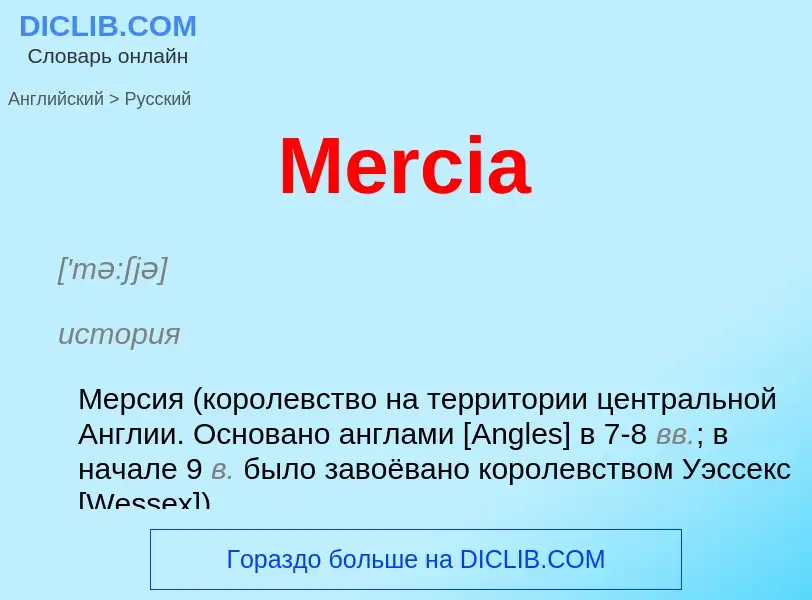Перевод и анализ слов искусственным интеллектом ChatGPT
На этой странице Вы можете получить подробный анализ слова или словосочетания, произведенный с помощью лучшей на сегодняшний день технологии искусственного интеллекта:
- как употребляется слово
- частота употребления
- используется оно чаще в устной или письменной речи
- варианты перевода слова
- примеры употребления (несколько фраз с переводом)
- этимология
Mercia - перевод на русский
['mə:ʃjə]
история
Мерсия (королевство на территории центральной Англии. Основано англами [Angles] в 7-8 вв.; в начале 9 в. было завоёвано королевством Уэссекс [Wessex])
синоним
['mə:ʃiən]
прилагательное
история
мерсийский
существительное
['mə:ʃiən]
общая лексика
мерсийский диалект
история
обитатель Мерсии
Определение
Википедия
Mercia (, Old English: Miercna rīċe; Latin: Merciorum regnum) was one of the three notable Anglic kingdoms founded after Sub-Roman Britain was settled by Anglo-Saxons in an era called the Heptarchy. It was centred around the River Trent and its tributaries, in a region now known as the Midlands of England.
A Latinisation of an Old English word derived from the Mercian dialect, Merce, meaning "borderland" (from which the Modern English word march also comes), the kingdom was rendered as Mierce or Myrce in the West Saxon dialect. The name is still used as a geographic designation by a wide range of organisations: military units, public, commercial and voluntary bodies.
The royal court moved around the kingdom without a fixed capital city. Early in its existence Repton seems to have been the location of an important royal estate. According to the Anglo-Saxon Chronicle, it was from Repton in 873–874 that the Great Heathen Army deposed the King of Mercia. Slightly earlier, King Offa seems to have favoured Tamworth. It was there where he was crowned and spent many a Christmas.
For 300 years (between 600 and 900), known as Mercian Supremacy or the "Golden Age of Mercia", having annexed or gained submissions from five of the other six kingdoms of the Heptarchy (East Anglia, Essex, Kent, Sussex and Wessex), Mercia dominated England south of the River Humber. During King Offa's reign, a dyke was created as the boundary between Mercia and the Welsh kingdoms. Nicholas Brooks noted that "the Mercians stand out as by far the most successful of the various early Anglo-Saxon peoples until the later ninth century", and some historians, such as Sir Frank Stenton, believe the unification of England south of the Humber estuary was achieved during Offa's reign.
King Peada converted to Christianity around 656, the Diocese of Mercia was founded in this year, with the first bishop (Diuma) based at Repton. The religion firmly established in the kingdom by the late 7th century. After 13 years at Repton, 669 AD, Saint Chad (the fifth bishop) moved the bishopric to Lichfield and, in 691 AD, the Diocese of Mercia became the Diocese of Lichfield. There has been a diocese based in the city ever since. For a brief period between 787 and 799 or 803 the diocese was an archbishopric. The current bishop, Michael Ipgrave, is the 99th since the diocese was established.
At the end of the 9th century, following the invasions of the Vikings and their Great Heathen Army, Danelaw absorbed much of the former Mercian territory. Danelaw at its height included London, all of East Anglia and most of the North of England.
The final Mercian king, Ceolwulf II, died in 879 with the kingdom appearing to have lost its political independence. Initially, it was ruled by a lord or ealdorman under the overlordship of Alfred the Great, who styled himself "King of the Anglo-Saxons". The kingdom had a brief period of independence in the mid-10th century and in 1016, by which time it was viewed as a province with temporary independence. Wessex conquered and united all the kingdoms into the Kingdom of England. The kingdom became an earldom until 1071.


![The [[Staffordshire Hoard]], discovered in a field in [[Hammerwich]], near [[Lichfield]] in July 2009, is perhaps the most important collection of [[Anglo-Saxon]] objects found in [[England]] The [[Staffordshire Hoard]], discovered in a field in [[Hammerwich]], near [[Lichfield]] in July 2009, is perhaps the most important collection of [[Anglo-Saxon]] objects found in [[England]]](https://commons.wikimedia.org/wiki/Special:FilePath/Staffordshire hoard annotated.jpg?width=200)
![Arms of [[St Albans]] City Council Arms of [[St Albans]] City Council](https://commons.wikimedia.org/wiki/Special:FilePath/UK COA St Albans.png?width=200)
